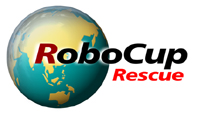
RoboCup Rescue
Description
The assignment for the RoboCup Rescue Simulation League is to build an Multi-Agent Community for Rescue Operations in Simulated Systems. The University of Amsterdam has participated in the 2003 competition, both in Germany and Italy.Specific for our approach will be construction of the WorldModel for each team of agents in the field (FireBrigades, AmbulanceTeams, PoliceForces), and additionally an estimation of the WorldModel of teams in the neighbourhood. This knowledge makes it easier to initiate the most appropiate cooperation between the different teams (see the workshop article).
The WorldModel can be decoupled in a high-level and low-level part. The high-level part is a situation assesment, indicating the severity of the problems on different sectors on the map. This situation assesment is synchronised between all agents via the centers on a regular basis (every 5 cycles). The low-level part are observations about roads, buildings, civilians. These observations are shared with team members that are nearby (see the symposium article).

During the German Open (see the report), it became clear that one has to be very carefully with the available computing power to guarantee that the agents decide before the end of the simulation cycle which action they take.
In the following two months we reduced the needed computing power with a factor of 50, which made it possible for an agent not only to consider its own actions, but also those from its team-mates (see the workshop presentation). Reduction of computing power always has is price, in this case the memory usage. Unfortunally in Italy memory was more scarce than computing power, so the UvA Rescue C2003 was not succesfully in its ranking.
After the summer the team relaxed the restrictions of the competition on the code to be able to research the impact of their communication and coordination models. The result is the following Master thesis.
Competitions
Paduva, Italy (Robocup 2003)- Arian
- YowAI2003
- SOS Amir Kabir University of Technology, Iran
- Black Sheep
- Eternity
- PAKRescueTeam
- PolyteCS 03 Amir Kabir University of Technology, Iran
- ResQ Freiburg
- Rayan Amir Kabir University of Technology, Iran
- SBCE_Saviour Shahid Beheshti University, Iran
- NITRescue
- RobotAkut
- SBCE_RES Shahid Beheshti University, Iran
- ToosRes Ferdowsi University of Mashhahd, Iran
- Uva Rescue C2003
- Ferdowski Ferdowsi University of Mashhahd, Iran
- Banzai http://www.teambanzai.tk
- ResQ Freiburg
- Uva Rescue C2003
- Arian
Links
Documents